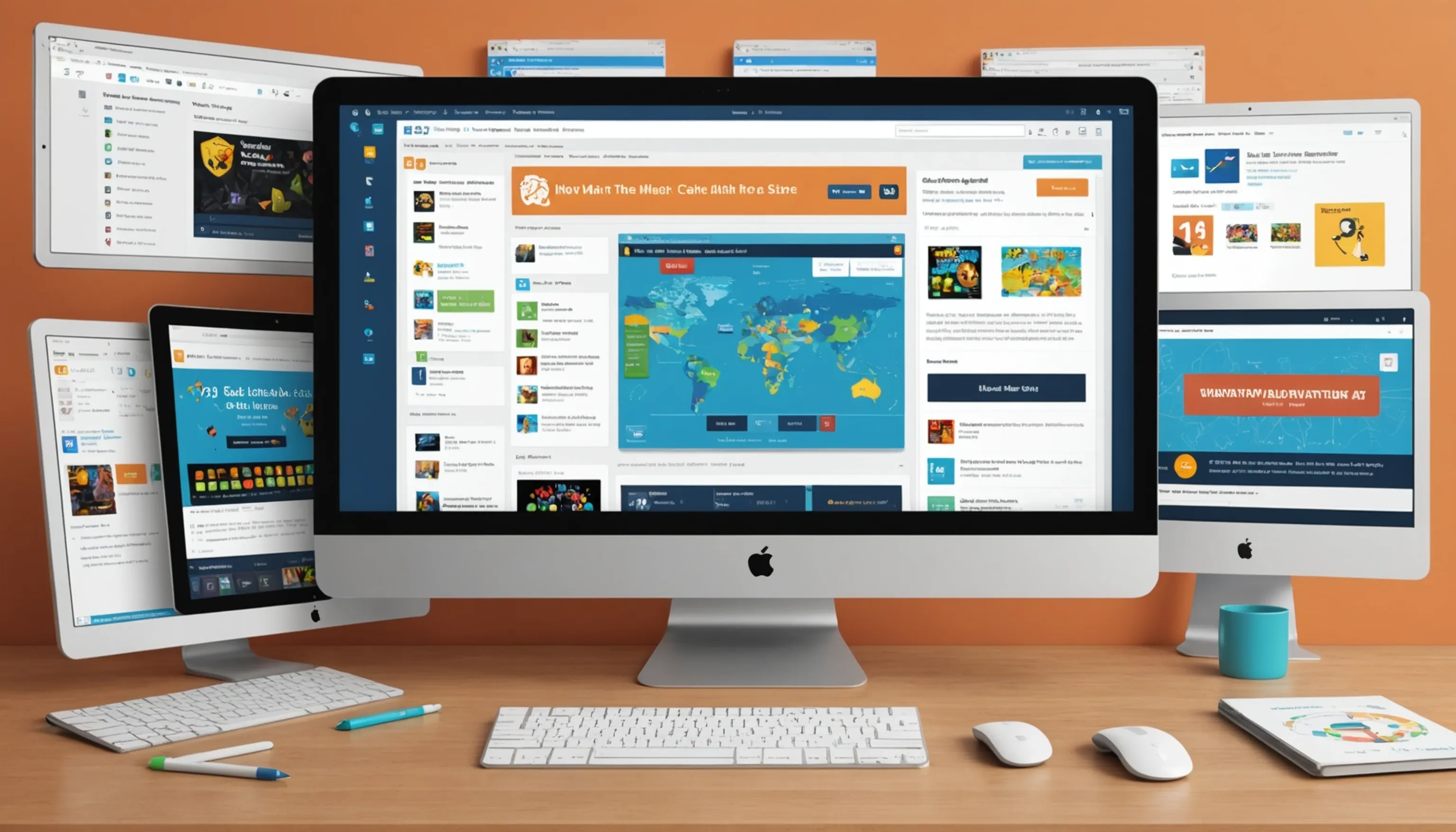Top Websites for Math Games in Education
 HvWHenry van Wagenberg
HvWHenry van Wagenberg
Top Websites for Math Games in Education
In today’s digital age, numerous websites for math games play a vital role in enhancing educational experiences for teenagers. These platforms provide engaging and interactive ways to learn math concepts, making it enjoyable and effective. Some top websites include:
- Khan Academy: Offers a wide range of lessons and practice problems.
- IXL Math: Provides personalized learning plans and real-time feedback.
- Prodigy Math Game: Combines gaming with curriculum-aligned math challenges.
- Math Playground: Features various math games, puzzles, and problem-solving activities.
These resources not only make learning fun but also help reinforce essential math skills.
Benefits of Math Games for Teenagers
Math games offer numerous benefits for teenagers, transforming the often daunting subject of mathematics into an engaging and enjoyable experience. Here are some key advantages:
- Enhancing Critical Thinking: Math games encourage teenagers to think critically and solve problems creatively. They often require players to strategize and make decisions, which sharpens their analytical skills.
- Boosting Confidence: As teenagers practice math through games, they gain confidence in their abilities. Successfully completing challenges and leveling up can positively impact their self-esteem.
- Promoting Collaboration: Many math games can be played in groups, fostering teamwork and communication skills. Working with peers on challenges helps teenagers learn from one another and develop social skills.
- Encouraging Persistence: Math games often present challenges that require multiple attempts to overcome. This persistence teaches teenagers resilience and the importance of not giving up, which is a valuable life skill.
- Real-World Application: Many math games incorporate real-world scenarios, helping teenagers understand the practical applications of math in everyday life. This relevance can increase their interest in the subject.
In summary, integrating math games into education can significantly enhance teenagers' learning experiences, making math more relatable and enjoyable. By leveraging these benefits, parents and teachers can help cultivate a positive attitude toward mathematics in their children.
How Math Games Enhance Learning
Math games serve as powerful tools for enhancing learning among teenagers, effectively bridging the gap between traditional education methods and modern, interactive experiences. Here’s how math games facilitate learning:
- Active Engagement: Unlike conventional worksheets, math games actively engage students. This involvement captures their attention and motivates them to participate, making learning feel less like a chore.
- Immediate Feedback: Many math games provide instant feedback, allowing teenagers to see their mistakes and correct them in real-time. This immediate reinforcement helps solidify concepts and reduces frustration associated with delayed feedback.
- Varied Learning Styles: Math games cater to different learning styles. Visual learners benefit from graphical representations, while auditory learners can engage with verbal instructions and discussions. Kinesthetic learners enjoy hands-on activities, all of which are often incorporated into game formats.
- Repetition and Practice: Math games encourage repetition in a fun way. By playing various levels and challenges, teenagers can practice skills without feeling bored. This repetition is crucial for mastery and retention of mathematical concepts.
- Goal Setting: Many math games involve levels or scores, motivating teenagers to set and achieve goals. This gamified approach fosters a sense of accomplishment and encourages continuous improvement.
In conclusion, math games enhance learning by making it interactive, engaging, and tailored to individual needs, thus promoting a deeper understanding of mathematical concepts.

Best Websites for Math Games
When it comes to finding the best websites for math games, several platforms stand out for their educational value and engaging content. Here are some top choices:
- Khan Academy: Offers comprehensive math tutorials and practice exercises.
- IXL Math: Provides personalized learning experiences with instant feedback.
- Prodigy Math Game: Combines a fantasy game with math challenges aligned to the curriculum.
- Math Playground: Features a variety of math games, puzzles, and problem-solving activities.
These websites help make math learning fun and interactive for teenagers.
Khan Academy
Khan Academy is a renowned educational platform that offers a wide range of resources for students, particularly in mathematics. This free online tool is designed to support learners of all ages, making it an excellent choice for teenagers looking to enhance their math skills.
One of the key features of Khan Academy is its comprehensive curriculum that covers everything from basic arithmetic to advanced calculus. The platform breaks down complex concepts into manageable lessons, using video tutorials that are easy to follow. Each video is accompanied by practice exercises that allow students to apply what they've learned in real-time.
The interactive nature of Khan Academy keeps students engaged. Teenagers can progress at their own pace, revisiting challenging topics until they gain confidence. Additionally, the platform tracks progress and offers personalized learning dashboards, helping students understand their strengths and areas for improvement.
Another significant advantage is the emphasis on mastery learning. Khan Academy encourages students to achieve a deep understanding of concepts before moving on to more advanced material. This approach not only builds a solid foundation in mathematics but also fosters critical thinking and problem-solving skills.
In conclusion, Khan Academy is an invaluable resource for teenagers aiming to strengthen their math abilities. Its user-friendly interface, extensive content, and focus on mastery make it a top choice for both students and educators.
IXL Math
IXL Math is an innovative online learning platform that provides personalized math practice for students of all ages, making it an ideal resource for teenagers. This subscription-based service stands out due to its comprehensive curriculum that aligns with educational standards across various grade levels.
One of the most compelling features of IXL Math is its adaptive learning technology. As students work through problems, the platform assesses their performance and adjusts the difficulty level accordingly. This ensures that teenagers are constantly challenged at an appropriate level, promoting sustained engagement and growth.
IXL Math offers a vast array of practice questions covering a wide range of topics, from basic arithmetic to advanced algebra and geometry. Each question is designed to reinforce essential concepts while providing immediate feedback, allowing students to learn from their mistakes and understand the correct solutions.
Additionally, IXL Math includes detailed explanations and step-by-step solutions for each problem, which helps students grasp the underlying principles. This feature is particularly beneficial for teenagers who may struggle with specific concepts and need extra guidance.
The platform also tracks progress and provides analytics, enabling both students and parents to monitor improvement over time. This data-driven approach helps identify strengths and weaknesses, allowing for targeted practice in areas that need more attention.
In summary, IXL Math is a valuable tool for teenagers looking to enhance their math skills through personalized, adaptive learning.

Prodigy Math Game
Prodigy Math Game is an engaging, game-based learning platform designed to make math fun for students, particularly teenagers. This interactive game combines the excitement of a fantasy adventure with curriculum-aligned math challenges, making it a popular choice among educators and parents alike.
In Prodigy, students create their own characters and embark on quests, solving math problems to progress in the game. This immersive experience keeps teenagers motivated and encourages them to practice math skills without the pressure often associated with traditional learning methods. The game adapts to each player's skill level, offering challenges that are appropriately difficult, which helps maintain engagement.
One of the standout features of Prodigy is its alignment with educational standards. The platform covers a wide range of topics, from basic arithmetic to more complex algebra and geometry concepts. This ensures that teenagers are practicing relevant skills that correspond to their grade level.
Additionally, Prodigy provides instant feedback on students' answers, allowing them to learn from mistakes immediately. The game also offers performance tracking for both students and parents, making it easy to monitor progress and identify areas for improvement.
Moreover, Prodigy emphasizes a growth mindset by encouraging students to take risks and learn from their errors. This approach helps build confidence in their math abilities and fosters a positive attitude toward learning.
In summary, Prodigy Math Game is an innovative tool that effectively combines education and entertainment, making math practice enjoyable for teenagers.
Math Playground
Math Playground is a versatile online platform that offers a rich collection of math games and activities tailored for students, especially teenagers. This educational resource provides an engaging environment where learners can practice essential math concepts while having fun.
One of the key features of Math Playground is its wide variety of games that cover multiple mathematical topics, including addition, subtraction, multiplication, division, fractions, and geometry. This diversity allows teenagers to find games that suit their interests and learning needs, ensuring a more personalized experience.
The platform is designed with user-friendliness in mind, allowing students to navigate easily through different categories and choose games that appeal to them. Many games incorporate problem-solving elements, which not only reinforce mathematical skills but also encourage critical thinking and logical reasoning.
Math Playground also includes instructional videos and interactive word problems, providing additional resources to help students understand complex concepts. These resources can be particularly helpful for teenagers who may struggle with specific areas of math.
Furthermore, Math Playground promotes collaboration and competition through multiplayer games, fostering social interaction among peers. This collaborative aspect can enhance motivation and make learning more enjoyable.
In summary, Math Playground is an excellent resource for teenagers looking to improve their math skills in a fun and interactive way. By combining games with educational content, it effectively supports a comprehensive learning experience.
How to Choose the Right Math Game for Your Teenager
Choosing the right math game for your teenager can significantly enhance their learning experience. Here are some tips to guide your selection:
- Consider Learning Goals: Identify what specific math skills your teenager needs to improve. Look for games that align with these goals, whether it's basic arithmetic or advanced algebra.
- Assess Game Difficulty Level: Ensure the game matches your teenager's skill level. Too easy may lead to boredom, while too difficult can cause frustration. Look for adaptive games that adjust difficulty based on performance.
- Look for Interactive Features: Choose games that incorporate interactive elements, such as problem-solving challenges, real-time feedback, and rewards for achievements. These features keep teenagers engaged and motivated to learn.
- Read Reviews: Check reviews from other parents or educators to gauge the effectiveness and enjoyment of the game.
By considering these factors, you can find a math game that will support your teenager's learning journey.
Consider Learning Goals
When selecting a math game for your teenager, it’s essential to consider their learning goals. Understanding what specific skills or concepts your teenager needs to develop will help you choose a game that effectively supports their learning journey.
Start by evaluating your teenager's current math abilities. Are they struggling with basic arithmetic, or do they need to strengthen their understanding of geometry or algebra? Identifying these areas will guide you in selecting a game that addresses their needs. For instance, if they struggle with fractions, look for games specifically designed to teach and reinforce that concept.
Additionally, consider the educational standards relevant to your teenager's grade level. Many math games are designed to align with curriculum standards, ensuring that the content is appropriate for their age and educational requirements. This alignment can help reinforce what they are learning in school.
Furthermore, set clear learning objectives. Do you want your teenager to improve their problem-solving skills, enhance their computational fluency, or develop critical thinking abilities? Different games focus on different aspects of math learning. By defining these goals, you can narrow down your options and choose a game that provides targeted practice.
In summary, considering your teenager's learning goals is crucial when selecting a math game. This approach ensures that the game not only engages them but also effectively supports their educational development.
Assess Game Difficulty Level
When selecting a math game for your teenager, it’s crucial to assess the game difficulty level. The right level of challenge can significantly impact your teenager's engagement and learning outcomes.
Start by considering your teenager’s current skill level. A game that is too easy may lead to boredom, while one that is too difficult can cause frustration. Finding the sweet spot is essential for maintaining motivation and promoting a positive learning experience. Look for games that offer adaptive difficulty settings, which adjust challenges based on the player's performance. This feature allows the game to grow with your teenager, ensuring they are always challenged but not overwhelmed.
Many educational platforms provide a clear breakdown of the skills targeted in their games, often categorizing them by grade level or complexity. Reviewing these descriptions can help you gauge whether the game aligns with your teenager's abilities. Additionally, consider the feedback mechanisms within the game. Games that offer immediate feedback can help students recognize when they are struggling with a concept and need to revisit it.
Another useful strategy is to trial a few games. Many educational platforms offer free trials or demo versions, allowing your teenager to explore the gameplay and determine if it's appropriately challenging. In summary, assessing the game difficulty level is key to ensuring your teenager remains engaged and continues to progress in their math skills.
Look for Interactive Features
When choosing a math game for your teenager, it's important to look for interactive features that enhance the learning experience. Interactive elements not only make learning more engaging but also help reinforce mathematical concepts effectively.
One of the key interactive features to consider is real-time feedback. Games that provide instant feedback allow teenagers to understand their mistakes immediately and learn the correct solutions. This encourages a growth mindset, as they can see their progress and areas that need improvement. Look for games that highlight correct and incorrect answers, offering explanations for why a particular answer is right or wrong.
Additionally, consider games that incorporate problem-solving challenges. These features encourage critical thinking and require players to apply their math skills in various scenarios. Games that present math problems in the context of puzzles or real-life situations can make learning more relatable and enjoyable.
Another interactive aspect to explore is collaboration and competition. Multiplayer options allow teenagers to work together or compete against peers, fostering teamwork and communication skills. This social interaction can make the learning process more enjoyable and motivate students to improve their skills.
Finally, look for games that include rewards or achievements. Systems that reward progress with badges or unlockable content can incentivize teenagers to keep playing and learning. In summary, prioritizing interactive features in math games can significantly enhance your teenager's educational experience.
